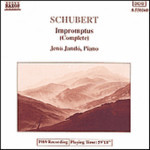
Impromptus (Complete)
 $25.00
Out of Stock
$25.00
Out of Stock6+ weeks add to cart
SCHUBERT
Impromptus (Complete)
Jeno Jando (piano)
[ Naxos / CD ]
Release Date: Thursday 4 September 2003
This item is currently out of stock. It may take 6 or more weeks to obtain from when you place your order as this is a specialist product.
"an artist with keen musical insights and a seemingly effortless technical command"
- Fanfare
Franz Schubert was born in Vienna in 1797, the son of a schoolmaster who had followed his brother to the Imperial capital from his native Moravia. Descended on his mother's side from Silesian stock, Schubert was as Viennese in language and outlook as any other inhabitant of the city, the cultural strength of which lay in its very mixture of races.
Schubert's family showed considerable musical enthusiasm, his father evidently the least proficient member of the family string quartet, in which he played the cello. Schubert himself, like Mozart before him, played the violin and viola, and was a proficient enough keyboard-player, if no great virtuoso. His musical and general education was at the Staatskonvikt, an institution he attended as a member of the choir of the Imperial Chapel directed by the Kapellmeister Antonio Salieri, his composition teacher. In 1812, when his voice broke, he left the choir and rather than continue an education that would have distracted him from music he chose in 1814 to embark on a course of teacher training, joining his father in the family business as an assistant teacher in the following year.
During these early years Schubert had shown considerable musical precocity. His first surviving compositions date from 1810 and by the following year he had embarked on the writing of the first of the many song settings in which his particular genius in melodic invention is shown. 1811 brought his first attempt at opera, a medium in which he never achieved any particular distinction, and his ambitious attempts at other forms of vocal and instrumental music. The following years brought a flood of music of all kinds so that by the end of the year in which he completed his formal education he had already written, among other things, three symphonies, a dozen or so string quartets and some fifty songs.
As a school-teacher Schubert showed little ability or interest and in 1816 he gave up the attempt, living thereafter intermittently with various friends, busy as a composer and as an important figure in his own circle, but never enjoying any official position as a musician. His last years were darkened by illness of syphilitic origin that first made itself known in 1823, its predictable and fatal progress awakening immediate fears for his life. He died in 1828, the year of the first public concert dedicated to his music, at a time when publishers were showing an increased interest in his work.
Tracks:
Four Impromptus Opus 90 D. 899
Four Impromptus Opus 142 D. 935



